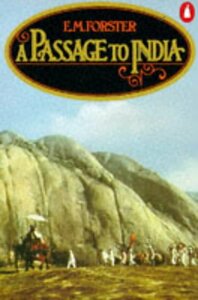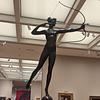You need to sign in or sign up before continuing.
Take a photo of a barcode or cover
This book made me think about friendship and what is required and expected of those we consider true friends. I enjoyed it very much, although I found the conclusion very sad, and what is even sadder is the plausibility of the whole thing, even in current times. This is a great read for anyone who has ever lived or visited a culture other than his/her own. I recommend it to everyone.
Historically, I can see where this is a classic. My edition had a wonderful introduction and timeline to all the things going on in India and Britain that Forster experienced. When I was looking up Book Club discussion questions, I saw that the reception in Britain to Passage was very critical and negative. So, I get it: the British don't like looking like racist Imperialists.
HOWEVER: reading this book was like pulling off a giant band-aid extremely slowly. Belabored much?? YES! I got so sick of the injustice and racism from every. single. person. It doesn't help that I was reading two other books focused on racism and injustice.
My friend Sarah said the characters seemed like caricatures (true and did help me a little with processing why I wasn't getting this book) and my friend Lisa said I picked the hardest Forster book to start with.
Ultimately, I ended up working too hard to finish this book. If I was in school and could have awesome guided discussions, this book would have been great! But I'm reading it for leisure so I don't want to work that hard.
I will say there were very poetic Forster moments that I really did love. And there was likely more nuanced stuff going on that I just plowed through because: leisure. I would have abandoned this long ago if I wasn't one that had chosen this book. But I did, so I had to take my lumps.
HOWEVER: reading this book was like pulling off a giant band-aid extremely slowly. Belabored much?? YES! I got so sick of the injustice and racism from every. single. person. It doesn't help that I was reading two other books focused on racism and injustice.
My friend Sarah said the characters seemed like caricatures (true and did help me a little with processing why I wasn't getting this book) and my friend Lisa said I picked the hardest Forster book to start with.
Ultimately, I ended up working too hard to finish this book. If I was in school and could have awesome guided discussions, this book would have been great! But I'm reading it for leisure so I don't want to work that hard.
I will say there were very poetic Forster moments that I really did love. And there was likely more nuanced stuff going on that I just plowed through because: leisure. I would have abandoned this long ago if I wasn't one that had chosen this book. But I did, so I had to take my lumps.
Read my full thoughts on Read.Write.Repeat.
"The book centers around Dr. Aziz, an Indian doctor, Mrs. Moore, an older English woman, Adela Quested, a young English girl engaged to Mrs. Moore's son, and Cyril Fielding, an Englishman who has befriended Aziz.
Mrs. Moore meets and befriends Aziz at a mosque, despite an initial misunderstanding of each other's intents. This encounter and subsequent ones all highlight the differences between the Indians and the British. While the characters are too polite - or perhaps too sanctimonious - to discuss the differences with each other, they continually cause misconceptions between parties. Each party is simply unable to read the other culture's social cues."
"The book centers around Dr. Aziz, an Indian doctor, Mrs. Moore, an older English woman, Adela Quested, a young English girl engaged to Mrs. Moore's son, and Cyril Fielding, an Englishman who has befriended Aziz.
Mrs. Moore meets and befriends Aziz at a mosque, despite an initial misunderstanding of each other's intents. This encounter and subsequent ones all highlight the differences between the Indians and the British. While the characters are too polite - or perhaps too sanctimonious - to discuss the differences with each other, they continually cause misconceptions between parties. Each party is simply unable to read the other culture's social cues."
This book is horribly written. It has so many abstract thoughts and comparisons that half the time you don't know what the hell is going on. And that is a problem, because otherwise the story actually has something to say.
Not my favorite book, but interesting none the less. Set in India during England's colonial rule in the early 1900's, this book is rife with mutual prejudice and racism between the English and Indian peoples. The book was somewhat chaotic at times, but it was an eye-opening look at the difficulty of friendship between people who are so heavily entrenched in their own thoughts and assumptions.
It gets two stars (instead of one) because I enjoyed the culture infused in the book. There were 5 or 6 chapters in the middle that were worth reading, but the other 30 or so were painfully slow. I probably would have enjoyed reading a nonfiction book about British occupation of India more than this novel.
adventurous
reflective
tense
slow-paced
Plot or Character Driven:
Plot
Strong character development:
N/A
Loveable characters:
No
Diverse cast of characters:
Yes
Flaws of characters a main focus:
Yes
Arguably Forster’s crowning achievement, A Passage to India is a vibrant and intense portrayal of humanity and the spirit of India. Upon arriving in the town of Chandrapore, Miss Adela Quested and her senior companion Mrs. Moore almost immediately feel the isolation and prejudices of the ‘Anglo-Indian’ community and desire a chance to experience the real India. A must read for those interested in British India and the haunting culture clash of the early twentieth century.
Published in 1924, Forster’s ability to create an unforgettable cast of characters and build complexity upon complexity is flabbergasting. The novel is brilliantly paced, heart-wrenching, and a wonderful commentary on human emotion and decency. Forster has a keen eye for irony, social dynamics and a powerful command of prose that flows like the Ganges itself. A Room with a View remains my personal favorite novel by Forster but there is no doubt that A Passage to India deserves the title of one of the greatest modern classics. 5/5
Published in 1924, Forster’s ability to create an unforgettable cast of characters and build complexity upon complexity is flabbergasting. The novel is brilliantly paced, heart-wrenching, and a wonderful commentary on human emotion and decency. Forster has a keen eye for irony, social dynamics and a powerful command of prose that flows like the Ganges itself. A Room with a View remains my personal favorite novel by Forster but there is no doubt that A Passage to India deserves the title of one of the greatest modern classics. 5/5
Forster has perhaps the lightest hand when it comes to the omniscient point of view. This plus the amused, witty tone of his voice in part accounts for the wonderful music found in his sentences. His descriptions of interiors, cities, villages, and nature are exquisite. Very early on, he is describing the blue quality of the sky over Chandrapore, and concludes with this:
"By day the blue will pale down into white where it touches the white of the land....But the core of blue persists, and so it is by night. Then the stars hang like lamps from the immense vault. The distance between the vault and them is as nothing to the distance behind them, and that farther distance, though beyond color, last freed itself from blue."
"Last freed itself from blue." Not only is all this syntactically musical, it's cognitively musical as well for the way it alludes to science, the speed of light in particular, streaking through the electromagnetic spectrum and saying goodbye at last to blue, indigo, and violet.
"By day the blue will pale down into white where it touches the white of the land....But the core of blue persists, and so it is by night. Then the stars hang like lamps from the immense vault. The distance between the vault and them is as nothing to the distance behind them, and that farther distance, though beyond color, last freed itself from blue."
"Last freed itself from blue." Not only is all this syntactically musical, it's cognitively musical as well for the way it alludes to science, the speed of light in particular, streaking through the electromagnetic spectrum and saying goodbye at last to blue, indigo, and violet.
This book troubles me. I find aspects of it pretty problematic--Forster is, after all, a product of his time even if he was a progressive man for the period. His descriptions of the people of India can be patronizing and exoticizing at the same time. However, I do love Forster's prose and I think he's a beautiful writer. I have fond memories of reading and discussing this one in seminar at university. But, yes, problematic, and really not my favourite of Forster's novels.




